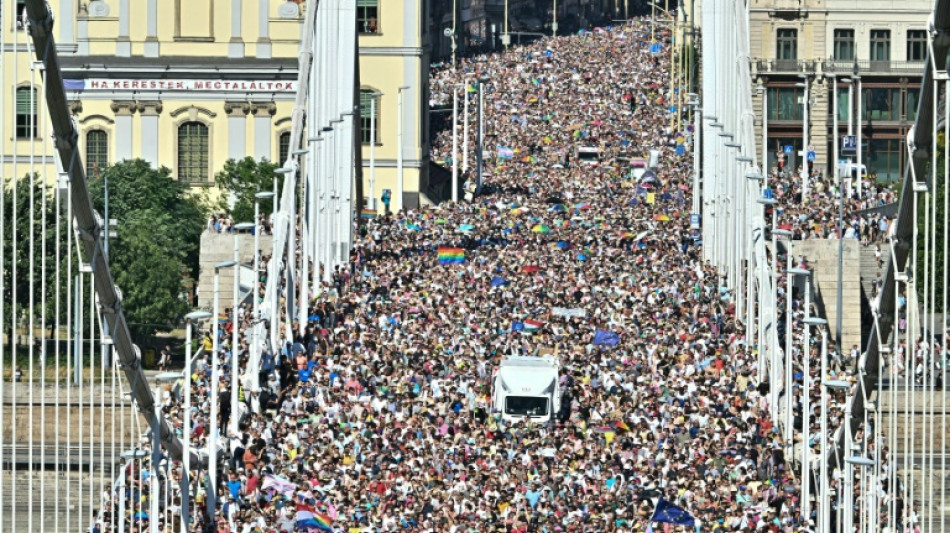
-
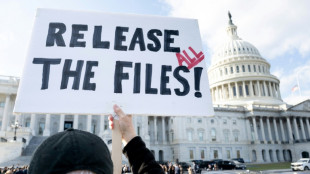 US lawmakers set for explosive vote on Epstein files
US lawmakers set for explosive vote on Epstein files
-
Gianfranco Rosi: the slow documentary maker in a frantic world
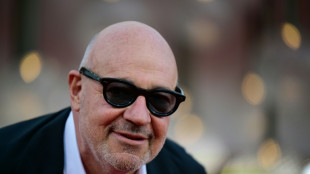
-
 P.Priime, Nigeria's young leading Afrobeats producer
P.Priime, Nigeria's young leading Afrobeats producer
-
Merz, Macron to push for European digital 'sovereignty'
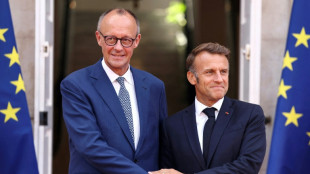
-
 Trump hosts Saudi prince for first time since Khashoggi killing
Trump hosts Saudi prince for first time since Khashoggi killing
-
Tonga's Katoa out of NRL season after brain surgery

-
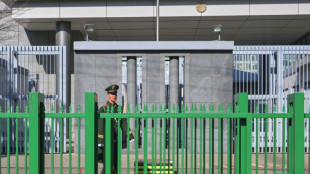 Japan warns citizens in China over safety amid Taiwan row
Japan warns citizens in China over safety amid Taiwan row
-
In Somalia, a shaky front line barely holds back the 'dogs of war'

-
 Shares in 'Baby Shark' studio jump on market debut
Shares in 'Baby Shark' studio jump on market debut
-
Thunder breeze past Pelicans, Pistons overpower Pacers

-
 Grieving Cowboys remember Kneeland, defeat Raiders
Grieving Cowboys remember Kneeland, defeat Raiders
-
Loaf behind bars: Aussie inmate says Vegemite a human right

-
 In film's second act, 'Wicked' goes beyond Broadway musical
In film's second act, 'Wicked' goes beyond Broadway musical
-
Asian markets track Wall St down with Nvidia, US jobs in view

-
 Scott Boland: the best 'spare' fast bowler around
Scott Boland: the best 'spare' fast bowler around
-
Fire and Ashes: England bank on fast bowling barrage in Australia

-
 North Korea says Seoul-US sub deal will trigger 'nuclear domino' effect
North Korea says Seoul-US sub deal will trigger 'nuclear domino' effect
-
Education for girls hit hard by India's drying wells

-
 Haitian gangs getting rich off murky market for baby eels
Haitian gangs getting rich off murky market for baby eels
-
Trump says will talk to Venezuela's Maduro, 'OK' with US strikes on Mexico

-
 Oscar Piastri wins Australia's top sports honour
Oscar Piastri wins Australia's top sports honour
-
'Severely restricted': Russia's Saint Petersburg faces cultural crackdown
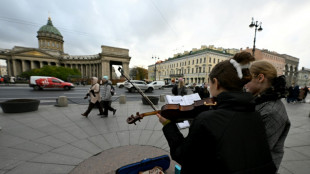
-
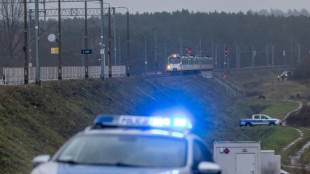 Polish PM denounces 'sabotage' of railway supply line to Ukraine
Polish PM denounces 'sabotage' of railway supply line to Ukraine
-
UK toughens asylum system with radical overhaul

-
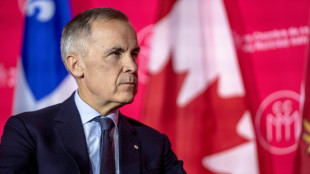 Carney's Liberals pass budget, avoiding snap Canada election
Carney's Liberals pass budget, avoiding snap Canada election
-
LeBron back in training, edges closer to Lakers return

-
 Climate talks run into night as COP30 hosts seek breakthrough
Climate talks run into night as COP30 hosts seek breakthrough
-
Germany and Netherlands lock up World Cup spots in style

-
 Germany's Woltemade hopes for 2026 World Cup spot after scoring again
Germany's Woltemade hopes for 2026 World Cup spot after scoring again
-
Germany 'send message' with Slovakia rout to reach 2026 World Cup

-
 Trump unveils fast-track visas for World Cup ticket holders
Trump unveils fast-track visas for World Cup ticket holders
-
Netherlands qualify for World Cup, Poland in play-offs

-
 Germany crush Slovakia to qualify for 2026 World Cup
Germany crush Slovakia to qualify for 2026 World Cup
-
Stocks gloomy on earnings and tech jitters, US rate worries

-
 'In it to win it': Australia doubles down on climate hosting bid
'In it to win it': Australia doubles down on climate hosting bid
-
Former NFL star Brown could face 30 yrs jail for shooting case: prosecutor

-
 Fate of Canada government hinges on tight budget vote
Fate of Canada government hinges on tight budget vote
-
New research measures how much plastic is lethal for marine life

-
 Mbappe, PSG face off in multi-million lawsuit
Mbappe, PSG face off in multi-million lawsuit
-
EU defends carbon tax as ministers take over COP30 negotiations

-
 McCartney to release silent AI protest song
McCartney to release silent AI protest song
-
Stocks tepid on uncertainty over earnings, tech rally, US rates

-
 Louvre shuts gallery over ceiling safety fears
Louvre shuts gallery over ceiling safety fears
-
'Stranded, stressed' giraffes in Kenya relocated as habitats encroached

-
 US Supreme Court to hear migrant asylum claim case
US Supreme Court to hear migrant asylum claim case
-
Western aid cuts could cause 22.6 million deaths, researchers say

-
 Clarke hails Scotland 'legends' ahead of crunch World Cup qualifier
Clarke hails Scotland 'legends' ahead of crunch World Cup qualifier
-
S.Africa says 'suspicious' flights from Israel show 'agenda to cleanse Palestinians'

-
 South Korea pledges to phase out coal plants at COP30
South Korea pledges to phase out coal plants at COP30
-
Ex-PSG footballer Hamraoui claims 3.5m euros damages against club


Major turnout as Budapest Pride defies Orban's ban in Hungary
With rainbow flags flying high, tens of thousands of people began marching Saturday for the Budapest Pride parade, defying a government ban that marks a major pushback against LGBTQ rights in the European Union.
Organisers expect a record turnout of more than 35,000 people for the 30th edition of the Pride march in the Hungarian capital, despite a police ban imposed by Prime Minister Viktor Orban's nationalist government.
"Many, many tens of thousands" are participating, organisers said on social media after the march started, as AFP journalists saw the festive crowd filling squares and streets along the route.
"I am proud to be gay... and I am very scared that the government wants to bring us down. I am very surprised that there are so many people, I want to cry," a 66-year-old participant, who gave only his first name, Zoltan, told AFP.
Orban's governing coalition amended laws and the constitution this year to prohibit the annual celebration, justifying his years-long clampdown on LGBTQ rights on "child protection" grounds.
Orban said Friday that while police would not "break up" the Pride march, those who took part should be aware of "legal consequences".
- Newly installed cameras -
Parade organisers risk up to a year in prison, and attendees can face fines up to 500 euros ($590).
The latest legal changes also empower the authorities to use facial-recognition technology to identify those who take part, and newly installed cameras have appeared on lamp posts along the parade route.
But participants were defiant as the march began chaotically under a scorching sun.
Marchers repeatedly had to pause to wait for police to stop traffic, according to AFP journalists at the scene.
Akos Horvath, an 18-year-old student who came to Budapest from a city in southern Hungary, said it was "of symbolic importance to come".
"It's not just about representing gay people, but about standing up for the rights of the Hungarian people," he told AFP on his way to the march.
Dozens of European lawmakers also attended in defiance of the ban.
"Freedom and love can't be banned," read one huge poster put up near city hall, the gathering point for the march.
Earlier this week, EU chief Ursula von der Leyen called on the Hungarian authorities to reverse the ban, while EU equalities commissioner Hadja Lahbib travelled to Hungary and spoke in support of the parade on Friday.
Thirty-three nations, including most EU countries, have also released a statement in support of the march.
At a press conference Saturday, several French MEPs called on the EU to take tougher measures against Orban's government over the crackdown on civil rights and other rule of law issues.
Budapest's opposition mayor Gergely Karacsony has insisted that no attendee should face any reprisals as the march is a municipal event that does not require police approval.
Some people also gathered along the route to protest against LGBTQ rights at the urging of far-right groups, including by putting up a wooden cross adorned with protest messages.
A woman who gave only her first name, Katalin, told AFP she agreed with the ban though she hoped there would be no clashes.
"Disgusting... it's become a fad to show off ourselves," she said.
- 'Polarising society' -
Since Orban's return to power in 2010, the country of 9.6 million people has been steadily rolling back LGBTQ rights.
But it is the first to ban a Pride march, with Orban saying he has been emboldened by the anti-diversity push by US President Donald Trump.
"Orban is employing a tried-and-tested recipe ahead of next year's election by generating a conflict," political analyst Daniel Mikecz told AFP, saying that Orban was "polarising society".
G.AbuOdeh--SF-PST


